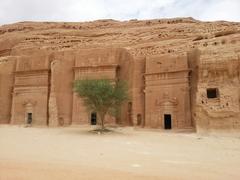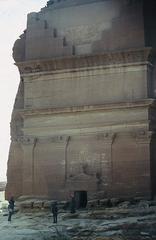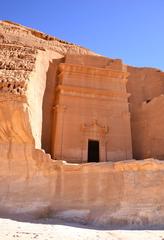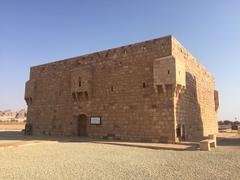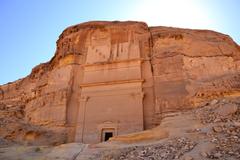King Fahad Industrial Port Yanbu: Visiting Hours, Tickets, and Complete Travel Guide
Date: 15/06/2025
Introduction: King Fahad Industrial Port Yanbu’s Role in Saudi Arabia
King Fahad Industrial Port Yanbu, located on the Red Sea in Medina Province, Saudi Arabia, stands as a vital economic and industrial hub. Since its establishment in 1980, the port has been instrumental in supporting Saudi Arabia’s energy exports and industrial growth, serving as a gateway for crude oil, refined petroleum products, and petrochemicals. Its strategic location along key global shipping lanes amplifies its importance, connecting the Kingdom to Europe, Asia, and Africa. While primarily an industrial complex with restricted access, it also serves as a point of interest for professionals, industry stakeholders, and select visitors who seek to understand the region’s maritime evolution and its proximity to significant religious and historical sites, particularly Medina.
This guide offers a comprehensive overview for those interested in visiting or learning about King Fahad Industrial Port Yanbu, focusing on access protocols, visiting hours, ticketing, cultural context, travel tips, and the broader historical and economic context that defines the port’s role in Saudi Arabia’s Vision 2030.
For the latest updates and detailed visitor information, consult resources like Sea Rise Marine Services, Marine Insight, and Dantful.
Table of Contents
- Introduction
- Historical Background and Maritime Heritage
- Strategic Location and Maritime Importance
- Economic Impact and Industrial Integration
- Geopolitical Significance in the Red Sea Region
- Role in Global Energy and Trade Flows
- Security and Risk Considerations
- Visiting King Fahad Industrial Port Yanbu
- Cultural Etiquette and Context
- Environmental Considerations
- Nearby Historical and Cultural Attractions
- Practical Visitor Tips
- Frequently Asked Questions (FAQs)
- Conclusion
- References
Historical Background and Maritime Heritage
King Fahad Industrial Port Yanbu was developed as part of Saudi Arabia’s ambitious push to diversify its economy and expand its industrial base. The growth of Yanbu as an industrial city in the 1970s made the port essential for the export of petroleum and petrochemical products and the import of industrial equipment (Seanav Marine). The port features 34 berths across 10 terminals, supporting vessels up to 500,000 tons, and includes container yards, open storage, and specialized terminals for various cargo types (Marine Insight).
Yanbu’s maritime legacy predates the port’s modern era, with the city serving for centuries as a waystation for traders and pilgrims. The port’s establishment marked Yanbu’s transformation from a historical seaport to a center for Saudi Arabia’s industrial ambitions (Dantful).
Strategic Location and Maritime Importance
Located along the Red Sea, the port connects the Kingdom to vital international trade routes. The Red Sea’s proximity to the Suez Canal makes it one of the world’s most significant maritime corridors, essential for energy shipments and global commerce (Special Eurasia). The port’s integration with national transportation infrastructure ensures Yanbu’s industrial products reach both domestic and global markets efficiently.
Economic Impact and Industrial Integration
King Fahad Industrial Port Yanbu is the largest export port on the Red Sea, handling over 210 million tons of cargo annually (Sea Rise Marine Services). The port’s facilities support Saudi Arabia’s major refineries and petrochemical plants, making it a linchpin in the Kingdom’s supply chain. Investments in new bunkering and storage facilities, including a SAR 2 billion project for integrated bunkering services, further strengthen its status as a logistics and energy hub (Ship & Bunker).
Geopolitical Significance in the Red Sea Region
The Red Sea’s strategic importance attracts global and regional powers, including China, the United States, and the UAE (Special Eurasia). Saudi Arabia’s continued investment in Yanbu’s port infrastructure is part of a broader strategy to maintain control and leverage in this contested region. The port’s security is paramount, given its role in global energy supplies and the potential impact of regional conflicts.
Role in Global Energy and Trade Flows
As a primary terminal for Saudi oil and petrochemical exports, the port is integral to international energy markets. Its advanced infrastructure allows it to accommodate mega-ships and bulk carriers, ensuring seamless movement of goods and minimizing delays (Seanav Marine).
Security and Risk Considerations
Security at the port is robust, with measures in place to address risks associated with regional instability, piracy, and geopolitical tensions (Special Eurasia). Visitors must comply with strict security protocols, and the port’s integration with national security agencies ensures rapid response to emerging threats.
Visiting King Fahad Industrial Port Yanbu
Visiting Hours and Access
- Operating Hours: The port functions Sunday to Thursday, generally from 8:00 AM to 5:00 PM. However, public access is highly restricted.
- Public Access: There is no walk-in admission. Visits are limited to authorized individuals—mainly business professionals, industry delegations, or educational groups with prior arrangement.
Tickets and Entry Requirements
- Tickets: There is no standard ticketing system. All access requires prior approval from the Saudi Ports Authority or a sponsoring company.
- Identification: Valid ID and, in some cases, security clearance are mandatory.
- Visa Requirements: International visitors must obtain the appropriate Saudi visa. For specifics, refer to the Saudi eVisa portal.
Arranging a Visit
- Sponsorship: Arrange visits through an affiliated company or official channels.
- Advance Booking: Early coordination is necessary for security clearance and scheduling.
- Safety Orientation: Visitors may be required to attend a safety briefing.
Visitor Facilities and Accessibility
- Facilities: As an industrial port, amenities focus on crew and operational needs rather than tourism. Expect basic provisions, medical support, and emergency services.
- Accessibility: The port provides accommodations for visitors with mobility needs in designated areas, but some zones remain off-limits due to safety regulations.
- Transport: Private vehicles are not allowed. Authorized shuttles or company vehicles facilitate on-site movement.
Cultural Etiquette and Context
Cultural and Religious Significance
Yanbu is historically linked to ancient trade and pilgrimage routes, and its proximity to Medina enhances its religious importance. Respect for local customs and religious practices is expected.
Visitor Etiquette
- Dress Code: Modest attire is required; women should wear loose clothing and a headscarf in public or religious spaces.
- Behavior: Avoid public displays of affection. Be mindful during prayer times.
- Photography: Prohibited in most port areas unless specifically authorized.
- Language: Arabic is the official language; English is widely spoken in business contexts.
Environmental Considerations
King Fahad Industrial Port Yanbu follows strict environmental management protocols to preserve surrounding coral reefs and marine life. Visitors should avoid littering and be conscious of water conservation due to the arid climate (Marine Insight).
Nearby Historical and Cultural Attractions
While the port itself is off-limits to general tourism, Yanbu offers several attractions:
- Yanbu Old Town: Traditional architecture and markets.
- Yanbu Heritage Museum: Insights into the region’s maritime and industrial past.
- Beaches and Red Sea Coastline: Renowned for coral reefs, diving, and relaxation.
- Yanbu Lakes and Historical Mosques: Scenic and culturally significant sites.
Practical Visitor Tips
- Plan visits well in advance, coordinating with the port authority or sponsoring organization.
- Bring identification, and be prepared for security checks.
- Respect all safety and cultural guidelines.
- Support local businesses during your stay in Yanbu.
- Stay updated on port operations and travel advisories.
Frequently Asked Questions (FAQs)
Q: Can the public visit King Fahad Industrial Port Yanbu?
A: No, public access is not allowed. Visits are limited to authorized guests.
Q: Are there tickets for tours?
A: There is no general ticketing system. Access must be arranged in advance through official channels.
Q: Is photography permitted?
A: Not without explicit permission due to security concerns.
Q: What safety gear is required?
A: Authorized visitors must wear protective equipment such as hard hats and safety vests.
Q: What are the main nearby attractions?
A: Yanbu Old Town, the Red Sea coastline, local markets, and heritage sites.
Conclusion
King Fahad Industrial Port Yanbu exemplifies Saudi Arabia’s blend of tradition and industrial achievement. While public access is restricted, the port remains a focal point for the Kingdom’s economic ambitions and maritime strategy. For those granted access, the port offers a unique perspective on Saudi Arabia’s industrial prowess, environmental stewardship, and the historic city of Yanbu. Visitors are encouraged to respect local traditions and contribute to the protection of the region’s heritage and natural beauty.
For more information, consult Sea Rise Marine Services, Marine Insight, Dantful, Seanav Marine, Special Eurasia, Ship & Bunker, Faisal Higgi Yanbu Industrial Port Guide, and the Saudi Ports Authority (Mawani).
References
- Sea Rise Marine Services
- Marine Insight
- Dantful
- Seanav Marine
- Special Eurasia
- Ship & Bunker
- Faisal Higgi Yanbu Industrial Port Guide
- Saudi Ports Authority (Mawani)
- Saudi eVisa

